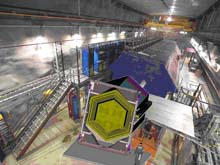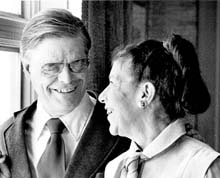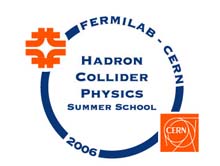 |
Wednesday, February 15, 2006 |
|
Wednesday, February 15
Thursday, February 16 |
|
Extended Forecast |
Secon Level 3 |
|
Wednesday, February 15 - Italian Wedding w/Meatballs - Diner Style Patty Melt - Chicken a la Mer - Beef & Broc - Greek Chicken Panini w/Feta Cheese - Sicilian Style Pizza - Grilled Chicken Bowtie in a Tomato Cream Sauce The Wilson Hall Cafe accepts Visa, Master Card, Discover and American Express. |
|
Wednesday, February 15
Thursday, February 16
Chez Leon Menu |
| Fermilab Today is online at: http://www.fnal.gov/today/ Send comments and suggestions to today@fnal.gov Fermilab Today archive Hurricane Relief Page Fermilab Today PDF Version Fermilab Result of the Week archive Fermilab Safety Tip of the Week archive Linear Collider News archive Fermilab Today classifieds Subscribe/Unsubscribe to |
| Jane Scheyer Wilson | ||||
|
|
Brookhaven National Laboratory and Fermi National Accelerator Laboratory Press Release, February 15, 2006: U.S. Researchers Put Global Science Grid to the Test Upton, NY and Batavia, IL - A global collaboration of physicists and computer scientists announced today the successful completion of a test of the first truly worldwide grid computing infrastructure. Researchers from two national laboratories and ten universities across the United States participated in the test, which saw data transferred around the world at a rate of up to one gigabyte per second.
Today's scientific discoveries in many fields, including particle physics, require massive amounts of data and the dedication of thousands of researchers. Grid computing transforms the way such scientists plan and conduct research. The current test is a crucial step on the way to making data from the Large Hadron Collider, the world's largest scientific instrument, available to scientists worldwide when the accelerator begins operating in 2007 at CERN in Geneva, Switzerland. In the current months-long test, or "service challenge," data were transferred from CERN to 12 major computing centers around the globe, including Brookhaven National Laboratory and Fermi National Accelerator Laboratory, and to more than 20 other computing facilities, ten of which are located at U.S. universities.
|
| Apply Now for 2006 HCP Summer School Session | ||
|
||
|
The 2006 Hadron Collider Physics Summer School, held at
Fermilab August 9-18 as the first in a joint CERN-Fermilab series,
is now accepting applications from advanced graduate students and recent
PhD's.
At the upcoming Summer School, students will learn a broad range of topics, from basic particle theory to the analysis of data from hadronic collisions. Many of the instructors will be Fermilab physicists with years of experience studying hadronic collisions in the Tevatron. “There is a great deal of background noise in proton collisions,” said Fermilab theorist Bogdan Dobrescu, co-director with Jeff Appel, Program Planning head. “We hope to give students a general understanding of how to sift through all that data in order to decipher the fundamental laws of nature.” The program offers classes for both theorists and experimentalists. “In the past, there has been a gap between these groups,” said Dobrescu. “We feel that the LHC, like the Tevatron, will greatly benefit from good communication between them.” Lecture highlights will include the Standard Model, physics beyond the Standard Model, theory of hadronic collisions, detectors, objects as seen in the detectors, and physics analysis, among other things. Dobrescu says that another goal of the summer school is to foster a sense of community: “We are getting people together who are really interested in pursuing this path,” he said. “It’s important for students who will later be experts in the field to get to know each other early on.”
If you would like more information, or would like to apply, visit the
HPC Summer School Website.
|
|
Last chance for survey participation So far more than 50 percent of Fermilab employees have filled in and submitted the Fermilab Today survey conducted by the University of Chicago Survey Lab. Thank you. The Survey Lab will close the online survey this Friday, February 17. If you have not yet completed the survey, please take 10 to 15 minutes of your time to answer the questions. Click on the link provided in the email from Kelly Daley of the Survey Lab. (If clicking doesn't work, please copy the entire link as one line into a Web browser.) We'd like to get feedback from as many lab employees as possible! Discounted Tickets to "String Theory" by The Chicago Chamber Musicians The concert will take place Sunday, February 19 at 7:30 p.m. at the Pick-Staiger Hall in Evanston and Monday, February 20 at 7:30 p.m. in the DePaul University Concert Hall in Chicago. The cost is $15 for physicists and physics educators and $10 for students with a valid ID. For tickets, call 312-225-5226 and mention the code words: "super-symmetry" to access the discount.
Rocketry Meeting
Folk Club Barn Dance
Professional Development Schedule:
Summer Housing Requests
|


